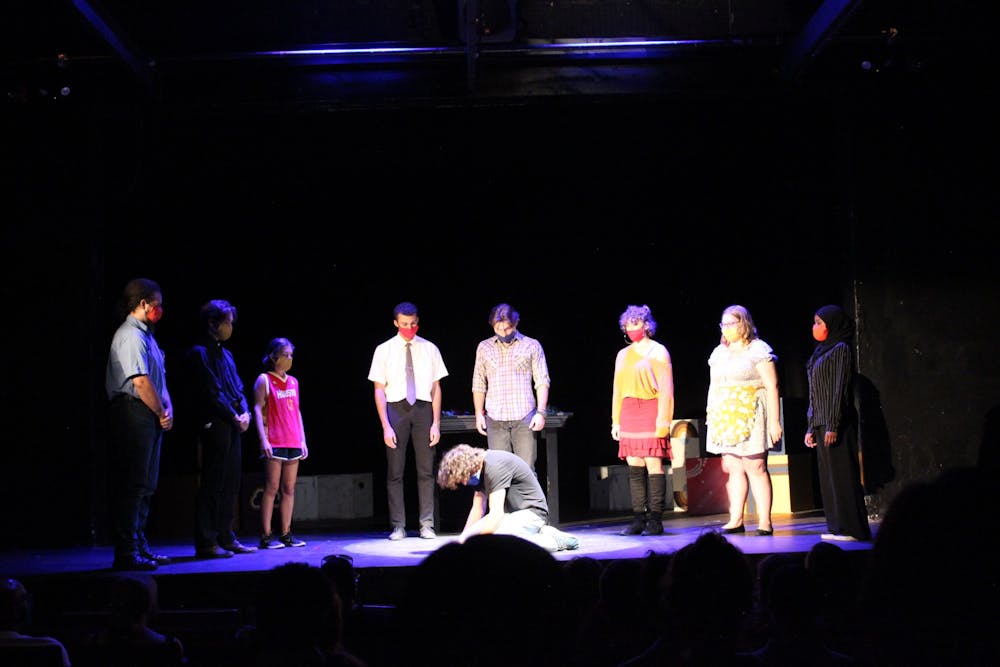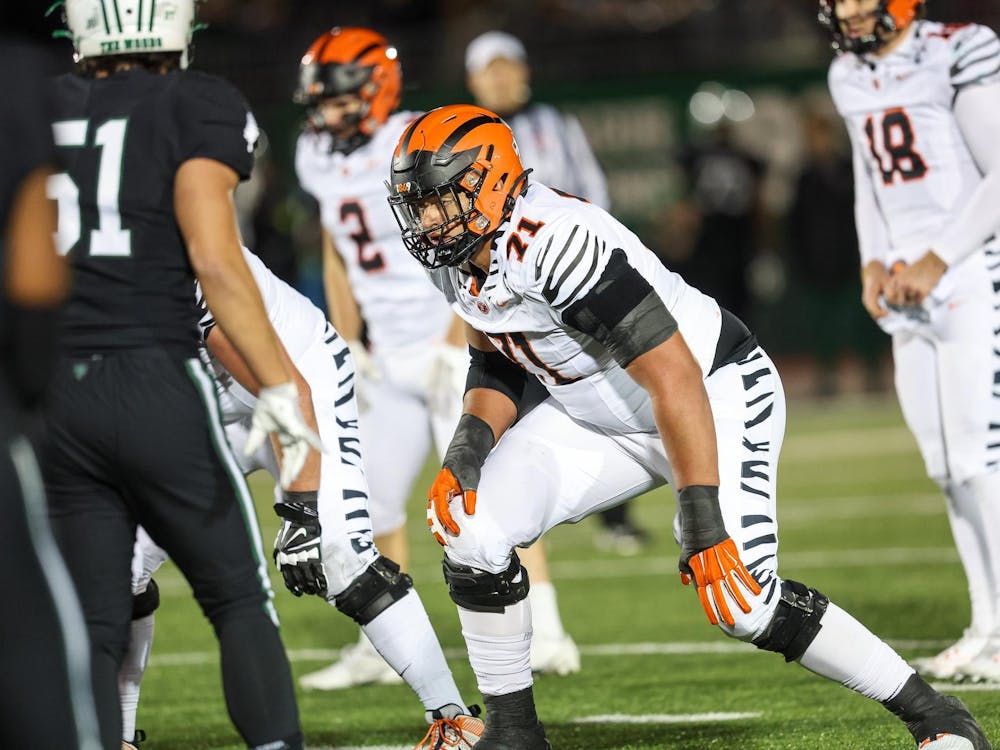Content Warning: The following article contains descriptions of gun violence.
Note from the writer: Due to the limited scope of a ‘Prince’ piece, it is impossible to address all the layers of complexity and nuance within both the script and the show’s execution. Remembering to balance personal mental health with the content of the show, I recommend seeing the play live and engaging with the production team and actors about their process for addressing the issues the show raises.
10 percent of all show proceeds are being donated to the Coalition to Stop Gun Violence.
“Sniper,” a play by Bonnie Culver, produced by Princeton’s Theatre Intime, is a compassionate telling of a story rife with grief and amorality. The play is a fictionalized portrayal of the life of a mass shooter and the irrevocable consequences of his actions. To carry the weight of such a sensitive narrative with grace and clarity is near impossible. The cast and crew of “Sniper” boldly shoulder this burden.
“Sniper” is Theatre Intime’s first show since the start of the pandemic, and COVID-19 restrictions have continued to impact the production process. Rehearsals for the show began on Zoom, and cast members performed wearing masks. The masks, while necessary, are a constant reminder of the current state of the world. Many scenes involve “drinking” in which characters comically raise bottles to their masks, “sipping” through the fabric. Mask adjustments also serve as small distractions throughout the show. However, despite these necessary evils of current theater, the cast manages to convey remarkable emotion, connection, and complexity, even with half of their face shielded from the audience and one another.
Pandemic restrictions are not the only challenges faced by the company of “Sniper.” The show opened amid controversy, having received complaints and concerns from students and advocacy groups, including Princeton Against Gun Violence (PAGV). Theatre Intime, already aware of the show’s sensitive nature, impactfully and appropriately addressed student concerns. Director Sabina Jafri ’24 and the Theatre Intime production team have presented a show that demonstrates an intensity of intentionality through sophisticated technical work, vulnerable character portrayals, and confrontation of topical themes.
Theatre Intime wrote in an email to PAGV, “We’re glad that other students are thinking as carefully about our season as we did when we chose it … we believe that the text of ‘Sniper’ is neither romanticizing shootings nor attempting to present them as entertainment.”
Grounded in a firm technical foundation, “Sniper” is transportive, invoking the power of live theater too long absent during COVID-19.
The set, designed and executed by Mel Hornyak ’23, is intelligent and minimalistic. It features blocks painted in 70s-style wallpaper. Each block’s design is inspired by the themes of a specific character: one block displays wallpaper loosely based on a cross, tying in the show’s themes of religious hypocrisy, while another has a cloud with “inverted colors,” hinting at the notions of mutability and affectation adopted by one of the characters.
The use of body percussion and subtle sound design builds atmosphere, filling out a world composed of nothing more than nine players, their blocks, and a single table. Meanwhile, creative use of simple costumes, music, and lighting highlights the passage of time and the development of tension between the characters.
Additionally, the staging of the show establishes palpable connections between characters, even as they are separated physically by masks and distance. This blocking forms a concrete sense of empathy and its absence.
The technical work serves as a dynamic backdrop to performances that transcend the script, adding a humanity and depth vital to the show.

The character of young Susan Jamison, the protagonist’s classmate played by Kate Stewart ’25, exemplifies the art, compassion, and logic that the protagonist lacks. Similarly, the football-playing Tom Davis, played by Violete Prete ’24, underscores the brave confrontation of weakness and ignorance that the protagonist could have emulated. These two characters are a stunning portrayal of how the story could have ended differently — who the protagonist could have been — forcing the audience to question, “what if?”
In the wake of traumatic experiences, questions of “what if” have the potential to spiral. But within the context of “Sniper,” these questions offer hope. Susan and Tom emphasize the better facets of humanity. They highlight the loving connections, desire for positive change, and sense of self that the protagonist forsakes. Susan and Tom are foils of the protagonist; the three of them are all imperfect, but Susan and Tom differ in the ways they confront the world’s brutality.
“People have been through much worse than [the protagonist], and not done the things he has done,” said Dominic Domingues ’25, who plays the protagonist. “We worked to make it so that there is no true sympathy [for the protagonist] beyond ‘he is a human being.’”
The company’s reckoning with the show’s themes is apparent, both in their performances and in the personal reflections they gave during the talk-back after the show. Their connections to the story, its themes, and the consequences of gun violence equip them to present the show meaningfully and authentically.
In a letter in the show’s program, Jafri wrote, “Performing for you tonight are survivors of gun violence, student activists, and students, like myself, who spent our high school years scared.”
During the talk-back, both cast and crew discussed how their relationship to the script had changed throughout the rehearsal process, and how the intentionality of the production team shaped the ethos of the performance.
“I didn’t like it in the first read through, the [story] on its own. But what made us pick it is that it didn’t exist on its own. Sabina came in with such a vision,” said Alexis Maze ’23, a cast member who also sits on Theatre Intime’s board, which is responsible for selecting the season’s shows. “As I’ve read the script again and again and again, it’s really been Sabina’s vision that has made me love it.”
“When I got the script I wasn’t really connected to it, but being adjacent to several instances of mass violence and then being around this cast, the whole process has been so freeing,” commented David Smith ’24. “We’ve expanded on it — Sabina has made it so much bigger than the script itself.”
The show serves as a powerful tool for healing and a poignant way to spark conversation. The show highlights issues that are too often oversimplified by the desire to easily explain. The production of “Sniper” advocates that confrontation and dialogue are vital to understanding and mitigating the devastation caused by mass violence.
At the talk-back, Smith stated, “This is us letting go of a specific explanation to point to. We are not glorifying it and we are not damning it. And I think that’s what acceptance is.”
“Sniper” is showing at Theatre Intime Oct. 8–10 at 8 p.m., including a talk-back with the playwright following the Oct. 9 performance.
Sydney Eck is a senior writer for The Prospect and Assistant Editor for Features who often covers artist profiles and food reviews (founder of Tiger Town Treats). She can be reached at seeck@princeton.edu or by Instagram @sydney.eck.








